Foreign Policy Analysis: perception, cognition & personality

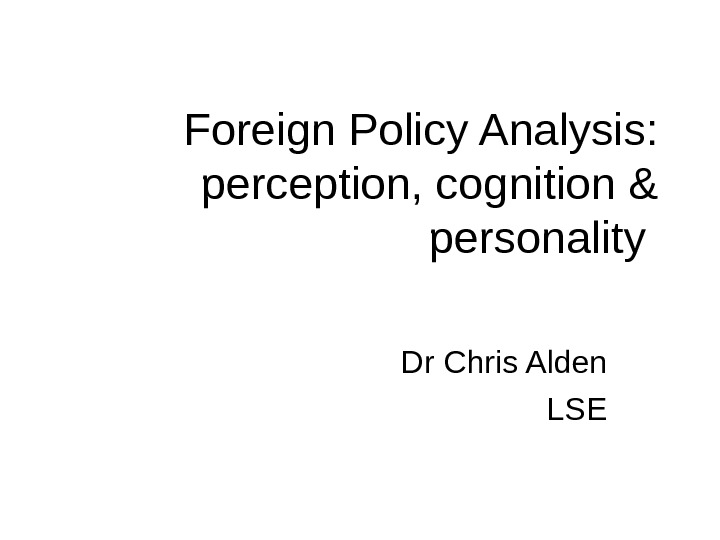
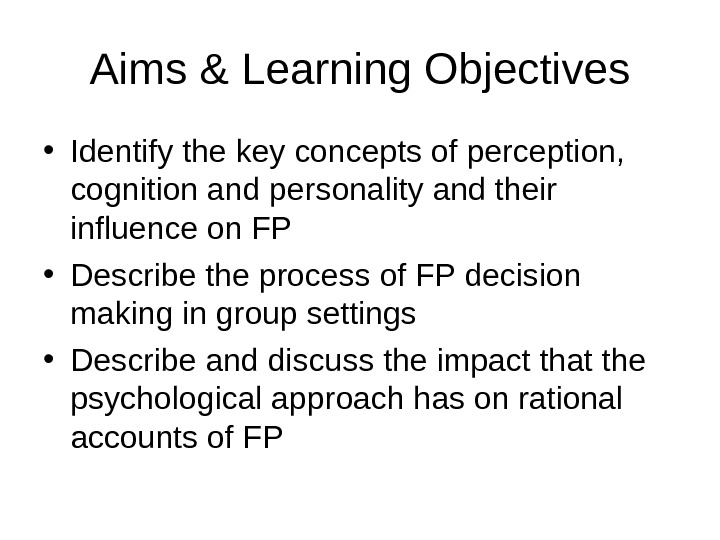
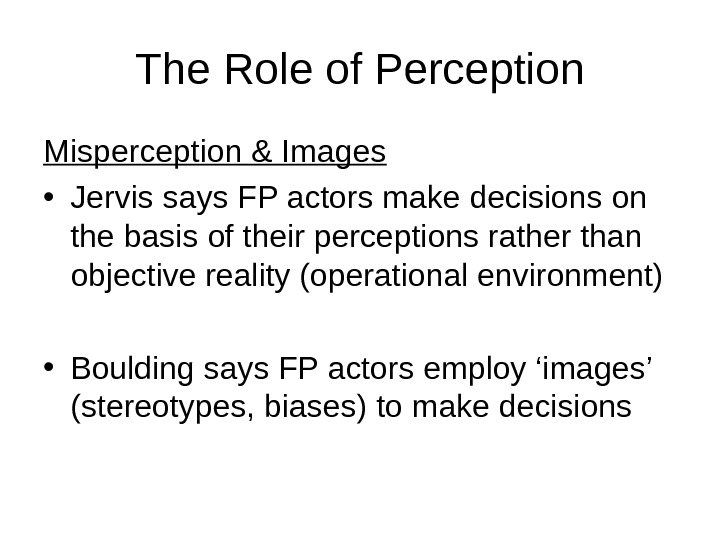
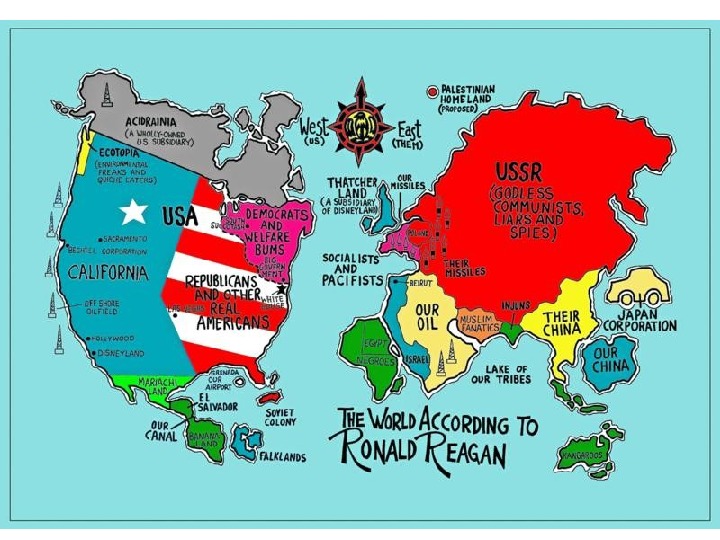
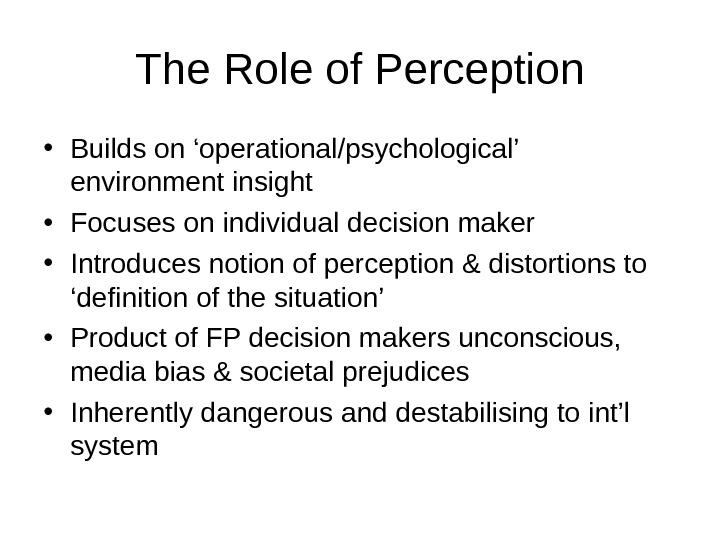
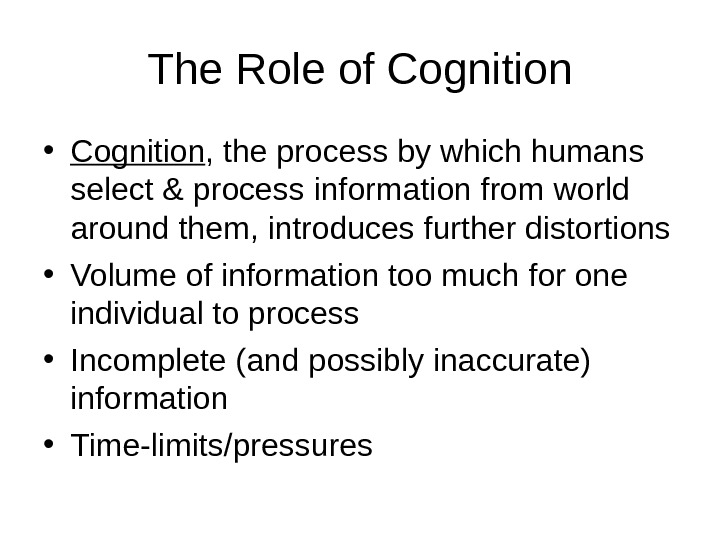
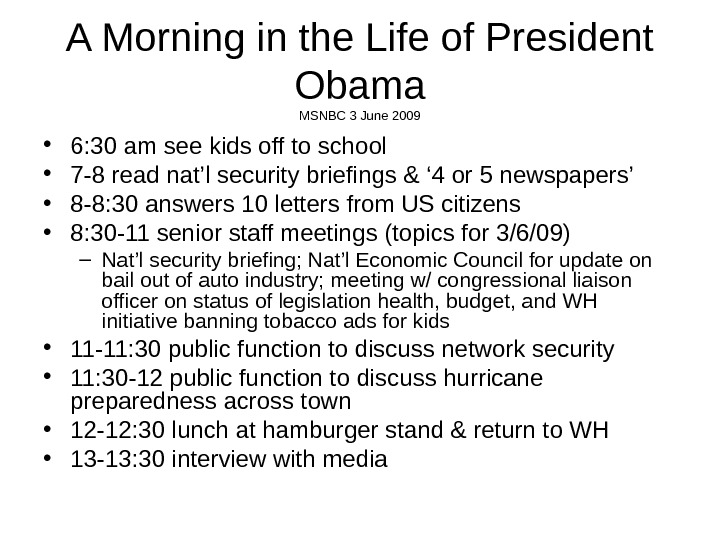
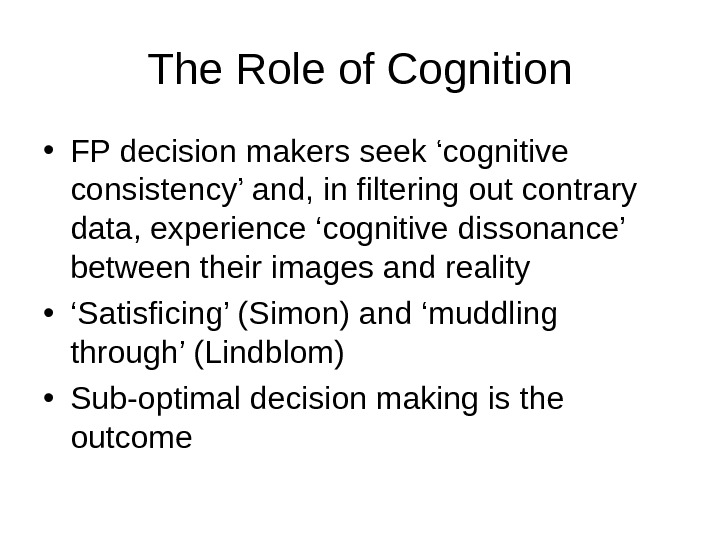
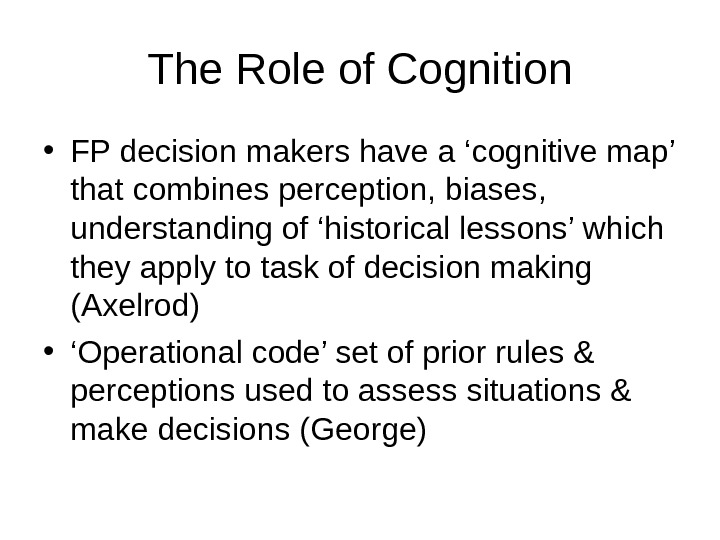
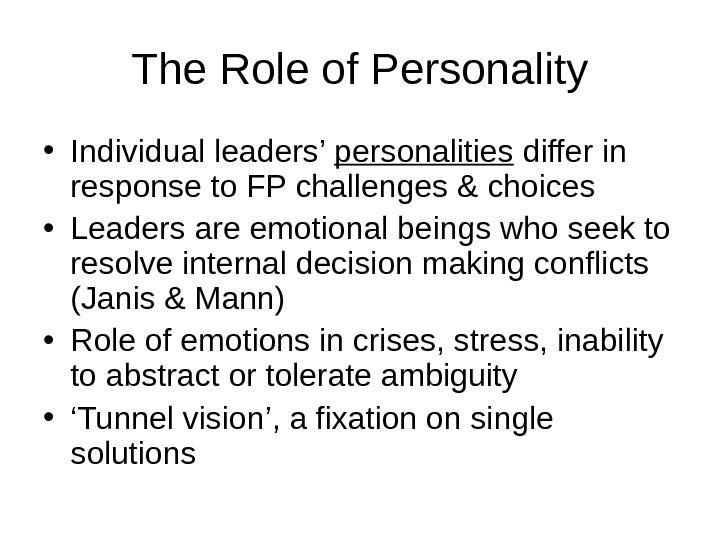
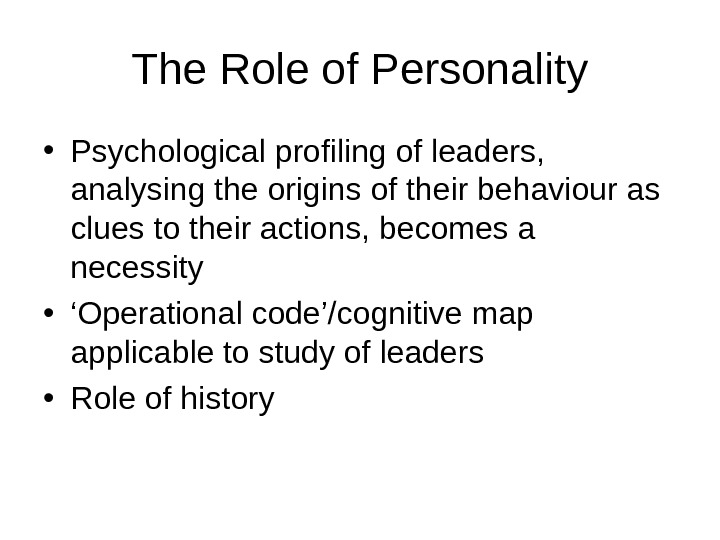
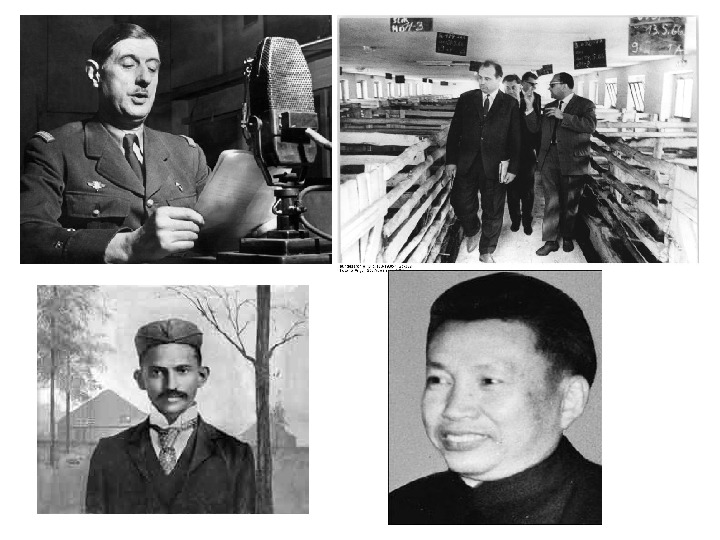
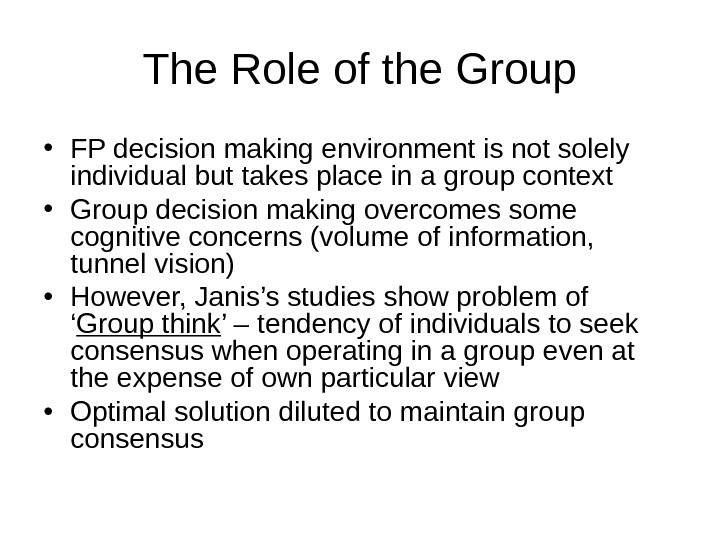
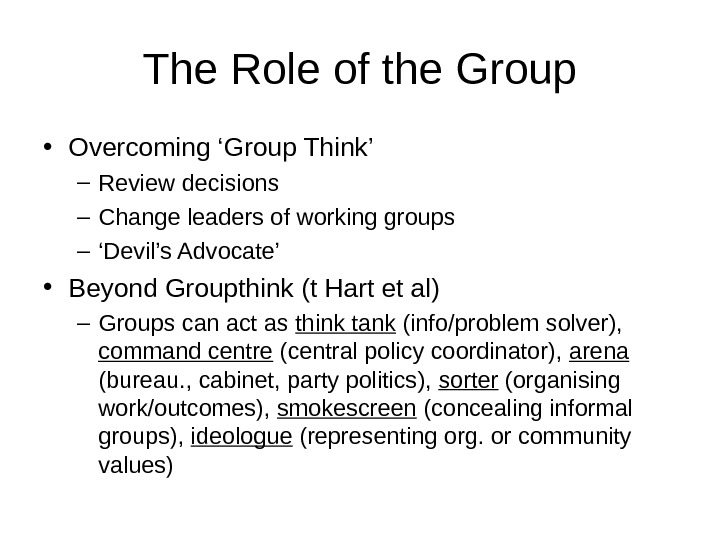
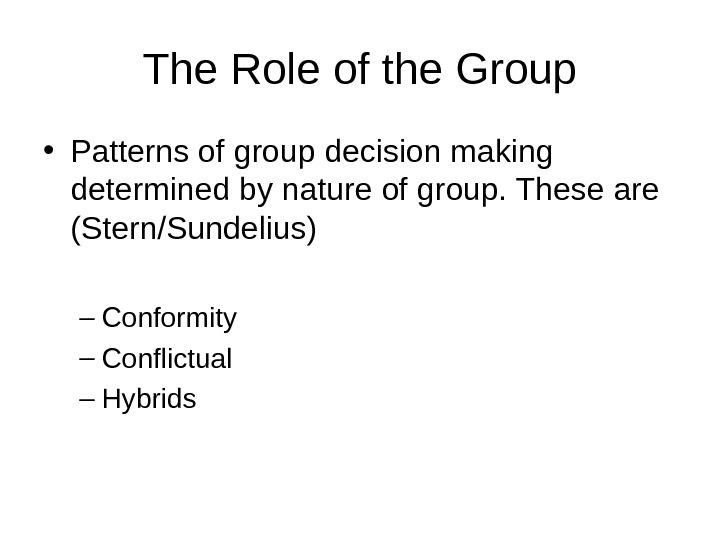
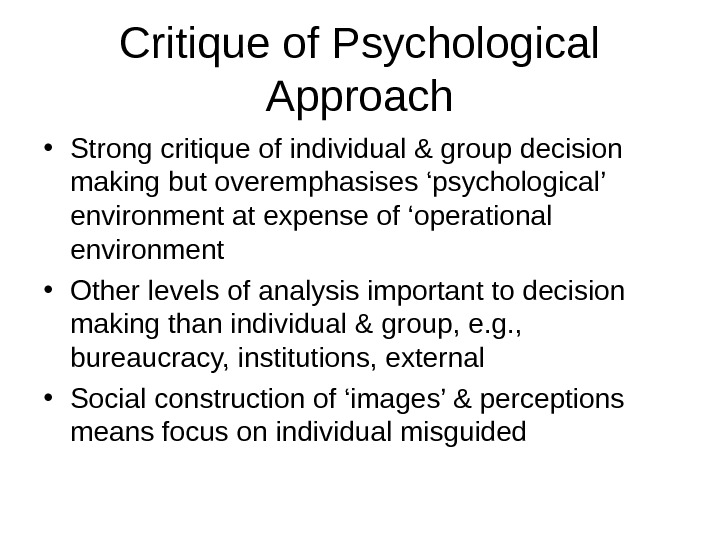
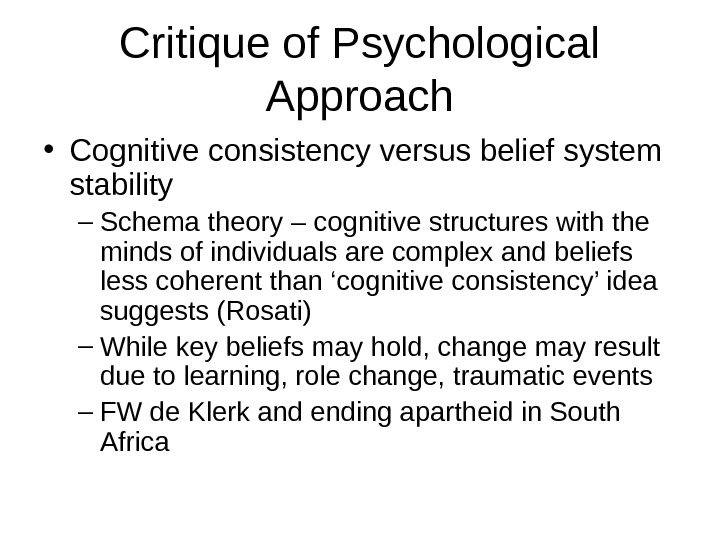
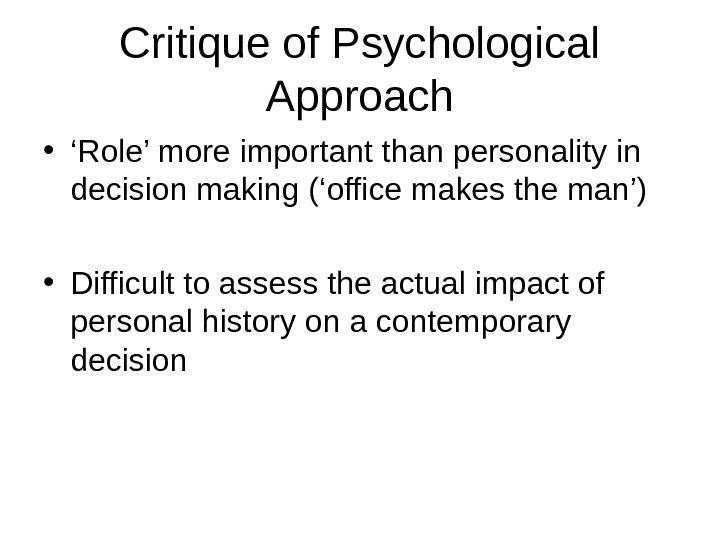
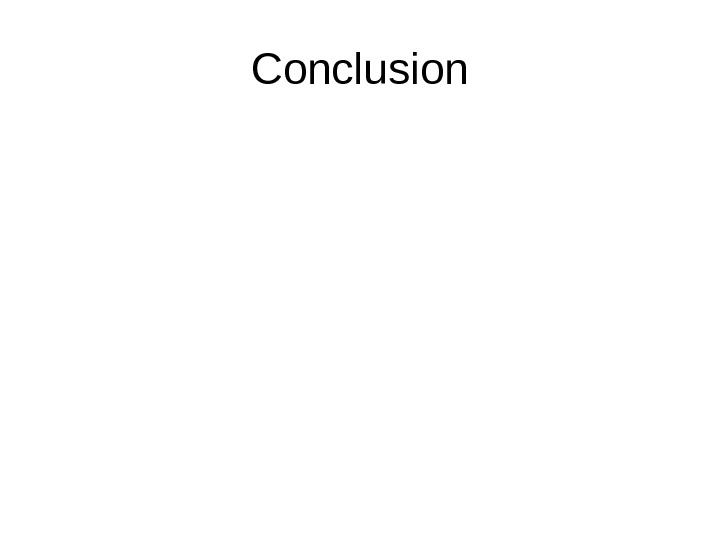
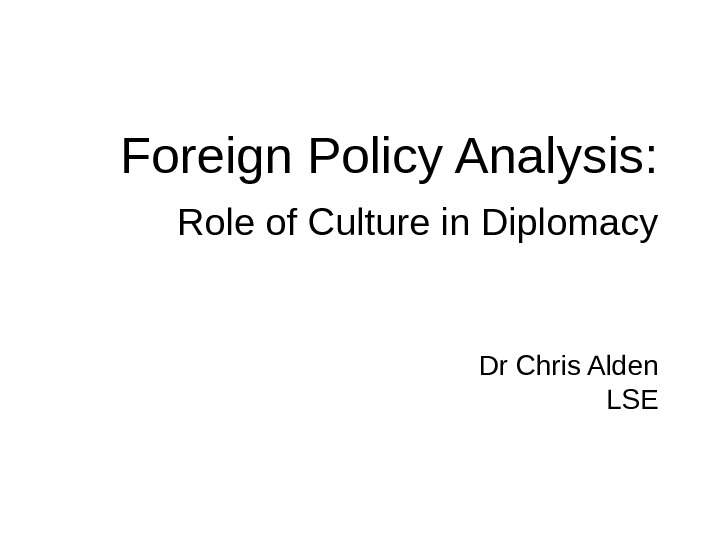
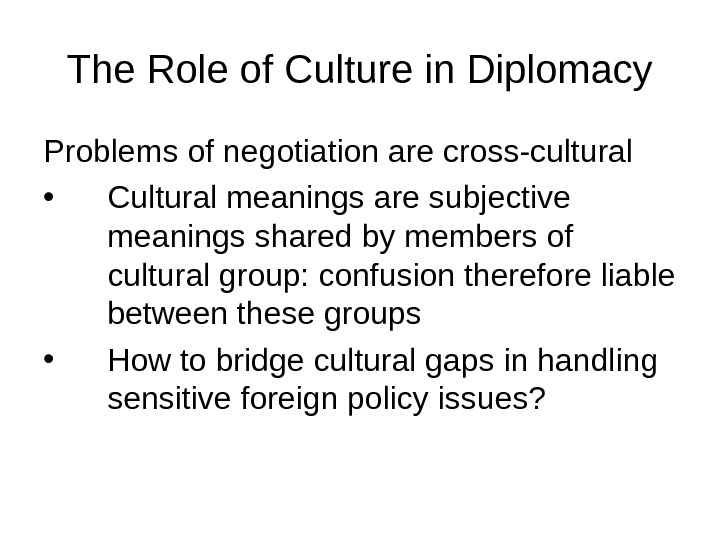
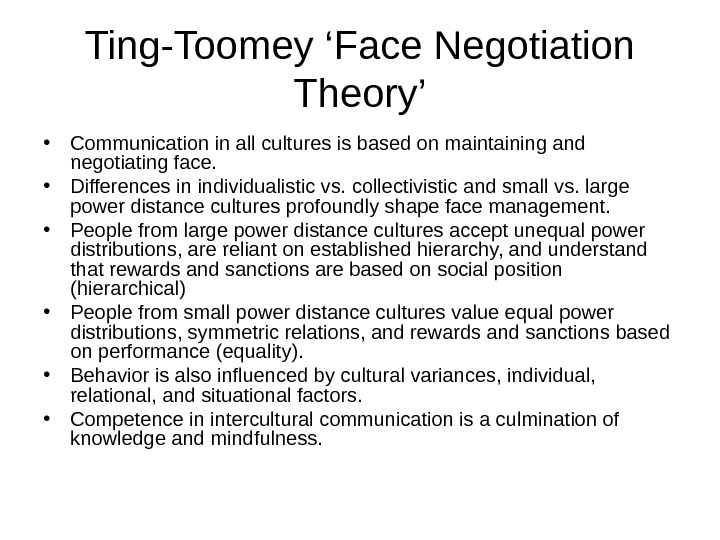
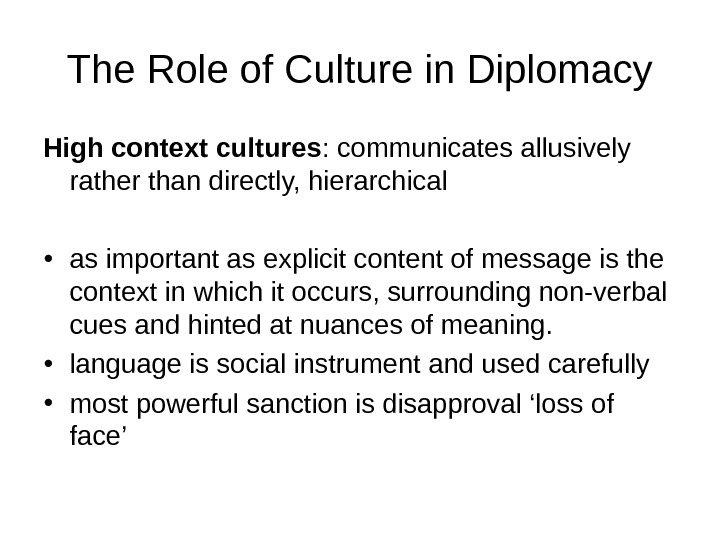
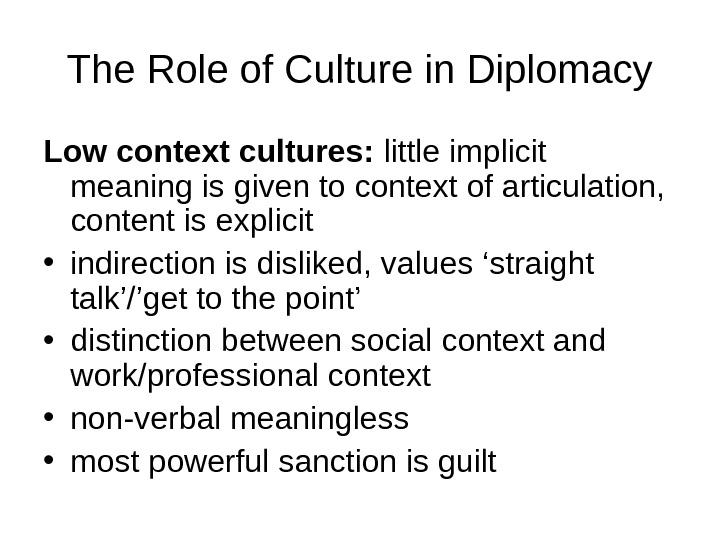
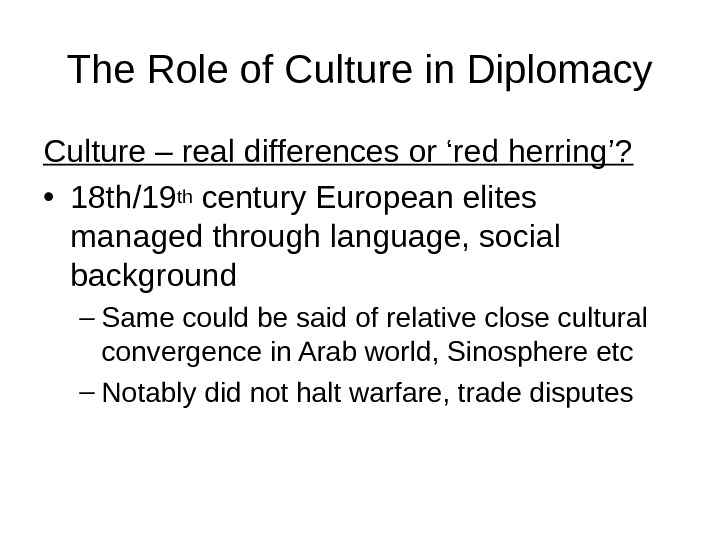
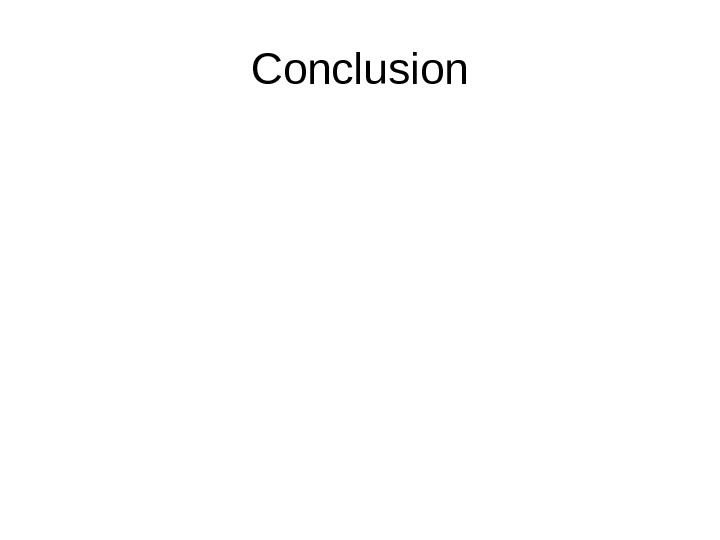
foreign_policy_analysis_4.ppt
- Размер: 359 Кб
- Количество слайдов: 26
Описание презентации Foreign Policy Analysis: perception, cognition & personality по слайдам
 Foreign Policy Analysis: perception, cognition & personality Dr Chris Alden LS
Foreign Policy Analysis: perception, cognition & personality Dr Chris Alden LS
 Aims & Learning Objectives • Identify the key concepts of perception, cognition and personality and their influence on FP • Describe the process of FP decision making in group settings • Describe and discuss the impact that the psychological approach has on rational accounts of FP
Aims & Learning Objectives • Identify the key concepts of perception, cognition and personality and their influence on FP • Describe the process of FP decision making in group settings • Describe and discuss the impact that the psychological approach has on rational accounts of FP
 The Role of Perception Misperception & Images • Jervis says FP actors make decisions on the basis of their perceptions rather than objective reality (operational environment) • Boulding says FP actors employ ‘images’ (stereotypes, biases) to make decisions
The Role of Perception Misperception & Images • Jervis says FP actors make decisions on the basis of their perceptions rather than objective reality (operational environment) • Boulding says FP actors employ ‘images’ (stereotypes, biases) to make decisions

 The Role of Perception • Builds on ‘operational/psychological’ environment insight • Focuses on individual decision maker • Introduces notion of perception & distortions to ‘definition of the situation’ • Product of FP decision makers unconscious, media bias & societal prejudices • Inherently dangerous and destabilising to int’l system
The Role of Perception • Builds on ‘operational/psychological’ environment insight • Focuses on individual decision maker • Introduces notion of perception & distortions to ‘definition of the situation’ • Product of FP decision makers unconscious, media bias & societal prejudices • Inherently dangerous and destabilising to int’l system
 The Role of Cognition • Cognition , the process by which humans select & process information from world around them, introduces further distortions • Volume of information too much for one individual to process • Incomplete (and possibly inaccurate) information • Time-limits/pressures
The Role of Cognition • Cognition , the process by which humans select & process information from world around them, introduces further distortions • Volume of information too much for one individual to process • Incomplete (and possibly inaccurate) information • Time-limits/pressures
 A Morning in the Life of President Obama MSNBC 3 June 2009 • 6: 30 am see kids off to school • 7 -8 read nat’l security briefings & ‘ 4 or 5 newspapers’ • 8 -8: 30 answers 10 letters from US citizens • 8: 30 -11 senior staff meetings (topics for 3/6/09) – Nat’l security briefing; Nat’l Economic Council for update on bail out of auto industry; meeting w/ congressional liaison officer on status of legislation health, budget, and WH initiative banning tobacco ads for kids • 11 -11: 30 public function to discuss network security • 11: 30 -12 public function to discuss hurricane preparedness across town • 12 -12: 30 lunch at hamburger stand & return to WH • 13 -13: 30 interview with media
A Morning in the Life of President Obama MSNBC 3 June 2009 • 6: 30 am see kids off to school • 7 -8 read nat’l security briefings & ‘ 4 or 5 newspapers’ • 8 -8: 30 answers 10 letters from US citizens • 8: 30 -11 senior staff meetings (topics for 3/6/09) – Nat’l security briefing; Nat’l Economic Council for update on bail out of auto industry; meeting w/ congressional liaison officer on status of legislation health, budget, and WH initiative banning tobacco ads for kids • 11 -11: 30 public function to discuss network security • 11: 30 -12 public function to discuss hurricane preparedness across town • 12 -12: 30 lunch at hamburger stand & return to WH • 13 -13: 30 interview with media
 The Role of Cognition • FP decision makers seek ‘cognitive consistency’ and, in filtering out contrary data, experience ‘cognitive dissonance’ between their images and reality • ‘ Satisficing’ (Simon) and ‘muddling through’ (Lindblom) • Sub-optimal decision making is the outcome
The Role of Cognition • FP decision makers seek ‘cognitive consistency’ and, in filtering out contrary data, experience ‘cognitive dissonance’ between their images and reality • ‘ Satisficing’ (Simon) and ‘muddling through’ (Lindblom) • Sub-optimal decision making is the outcome
 The Role of Cognition • FP decision makers have a ‘cognitive map’ that combines perception, biases, understanding of ‘historical lessons’ which they apply to task of decision making (Axelrod) • ‘ Operational code’ set of prior rules & perceptions used to assess situations & make decisions (George)
The Role of Cognition • FP decision makers have a ‘cognitive map’ that combines perception, biases, understanding of ‘historical lessons’ which they apply to task of decision making (Axelrod) • ‘ Operational code’ set of prior rules & perceptions used to assess situations & make decisions (George)
 The Role of Personality • Individual leaders’ personalities differ in response to FP challenges & choices • Leaders are emotional beings who seek to resolve internal decision making conflicts (Janis & Mann) • Role of emotions in crises, stress, inability to abstract or tolerate ambiguity • ‘ Tunnel vision’, a fixation on single solutions
The Role of Personality • Individual leaders’ personalities differ in response to FP challenges & choices • Leaders are emotional beings who seek to resolve internal decision making conflicts (Janis & Mann) • Role of emotions in crises, stress, inability to abstract or tolerate ambiguity • ‘ Tunnel vision’, a fixation on single solutions
 The Role of Personality • Psychological profiling of leaders, analysing the origins of their behaviour as clues to their actions, becomes a necessity • ‘ Operational code’/cognitive map applicable to study of leaders • Role of history
The Role of Personality • Psychological profiling of leaders, analysing the origins of their behaviour as clues to their actions, becomes a necessity • ‘ Operational code’/cognitive map applicable to study of leaders • Role of history

 The Role of the Group • FP decision making environment is not solely individual but takes place in a group context • Group decision making overcomes some cognitive concerns (volume of information, tunnel vision) • However, Janis’s studies show problem of ‘ Group think ’ – tendency of individuals to seek consensus when operating in a group even at the expense of own particular view • Optimal solution diluted to maintain group consensus
The Role of the Group • FP decision making environment is not solely individual but takes place in a group context • Group decision making overcomes some cognitive concerns (volume of information, tunnel vision) • However, Janis’s studies show problem of ‘ Group think ’ – tendency of individuals to seek consensus when operating in a group even at the expense of own particular view • Optimal solution diluted to maintain group consensus
 The Role of the Group • Overcoming ‘Group Think’ – Review decisions – Change leaders of working groups – ‘ Devil’s Advocate’ • Beyond Groupthink (t Hart et al) – Groups can act as think tank (info/problem solver), command centre (central policy coordinator), arena (bureau. , cabinet, party politics), sorter (organising work/outcomes), smokescreen (concealing informal groups), ideologue (representing org. or community values)
The Role of the Group • Overcoming ‘Group Think’ – Review decisions – Change leaders of working groups – ‘ Devil’s Advocate’ • Beyond Groupthink (t Hart et al) – Groups can act as think tank (info/problem solver), command centre (central policy coordinator), arena (bureau. , cabinet, party politics), sorter (organising work/outcomes), smokescreen (concealing informal groups), ideologue (representing org. or community values)
 The Role of the Group • Patterns of group decision making determined by nature of group. These are (Stern/Sundelius) – Conformity – Conflictual – Hybrids
The Role of the Group • Patterns of group decision making determined by nature of group. These are (Stern/Sundelius) – Conformity – Conflictual – Hybrids
 Critique of Psychological Approach • Strong critique of individual & group decision making but overemphasises ‘psychological’ environment at expense of ‘operational environment • Other levels of analysis important to decision making than individual & group, e. g. , bureaucracy, institutions, external • Social construction of ‘images’ & perceptions means focus on individual misguided
Critique of Psychological Approach • Strong critique of individual & group decision making but overemphasises ‘psychological’ environment at expense of ‘operational environment • Other levels of analysis important to decision making than individual & group, e. g. , bureaucracy, institutions, external • Social construction of ‘images’ & perceptions means focus on individual misguided
 Critique of Psychological Approach • Cognitive consistency versus belief system stability – Schema theory – cognitive structures with the minds of individuals are complex and beliefs less coherent than ‘cognitive consistency’ idea suggests (Rosati) – While key beliefs may hold, change may result due to learning, role change, traumatic events – FW de Klerk and ending apartheid in South Africa
Critique of Psychological Approach • Cognitive consistency versus belief system stability – Schema theory – cognitive structures with the minds of individuals are complex and beliefs less coherent than ‘cognitive consistency’ idea suggests (Rosati) – While key beliefs may hold, change may result due to learning, role change, traumatic events – FW de Klerk and ending apartheid in South Africa
 Critique of Psychological Approach • ‘ Role’ more important than personality in decision making (‘office makes the man’) • Difficult to assess the actual impact of personal history on a contemporary decision
Critique of Psychological Approach • ‘ Role’ more important than personality in decision making (‘office makes the man’) • Difficult to assess the actual impact of personal history on a contemporary decision
 Conclusion
Conclusion
 Foreign Policy Analysis: Role of Culture in Diplomacy Dr Chris Alden LS
Foreign Policy Analysis: Role of Culture in Diplomacy Dr Chris Alden LS
 The Role of Culture in Diplomacy Problems of negotiation are cross-cultural • Cultural meanings are subjective meanings shared by members of cultural group: confusion therefore liable between these groups • How to bridge cultural gaps in handling sensitive foreign policy issues?
The Role of Culture in Diplomacy Problems of negotiation are cross-cultural • Cultural meanings are subjective meanings shared by members of cultural group: confusion therefore liable between these groups • How to bridge cultural gaps in handling sensitive foreign policy issues?
 Ting-Toomey ‘Face Negotiation Theory’ • Communication in all cultures is based on maintaining and negotiating face. • Differences in individualistic vs. collectivistic and small vs. large power distance cultures profoundly shape face management. • People from large power distance cultures accept unequal power distributions, are reliant on established hierarchy, and understand that rewards and sanctions are based on social position (hierarchical) • People from small power distance cultures value equal power distributions, symmetric relations, and rewards and sanctions based on performance (equality). • Behavior is also influenced by cultural variances, individual, relational, and situational factors. • Competence in intercultural communication is a culmination of knowledge and mindfulness.
Ting-Toomey ‘Face Negotiation Theory’ • Communication in all cultures is based on maintaining and negotiating face. • Differences in individualistic vs. collectivistic and small vs. large power distance cultures profoundly shape face management. • People from large power distance cultures accept unequal power distributions, are reliant on established hierarchy, and understand that rewards and sanctions are based on social position (hierarchical) • People from small power distance cultures value equal power distributions, symmetric relations, and rewards and sanctions based on performance (equality). • Behavior is also influenced by cultural variances, individual, relational, and situational factors. • Competence in intercultural communication is a culmination of knowledge and mindfulness.
 The Role of Culture in Diplomacy High context cultures : communicates allusively rather than directly, hierarchical • as important as explicit content of message is the context in which it occurs, surrounding non-verbal cues and hinted at nuances of meaning. • language is social instrument and used carefully • most powerful sanction is disapproval ‘loss of face’
The Role of Culture in Diplomacy High context cultures : communicates allusively rather than directly, hierarchical • as important as explicit content of message is the context in which it occurs, surrounding non-verbal cues and hinted at nuances of meaning. • language is social instrument and used carefully • most powerful sanction is disapproval ‘loss of face’
 The Role of Culture in Diplomacy Low context cultures: little implicit meaning is given to context of articulation, content is explicit • indirection is disliked, values ‘straight talk’/’get to the point’ • distinction between social context and work/professional context • non-verbal meaningless • most powerful sanction is guilt
The Role of Culture in Diplomacy Low context cultures: little implicit meaning is given to context of articulation, content is explicit • indirection is disliked, values ‘straight talk’/’get to the point’ • distinction between social context and work/professional context • non-verbal meaningless • most powerful sanction is guilt
 The Role of Culture in Diplomacy Culture – real differences or ‘red herring’? • 18 th/19 th century European elites managed through language, social background – Same could be said of relative close cultural convergence in Arab world, Sinosphere etc – Notably did not halt warfare, trade disputes
The Role of Culture in Diplomacy Culture – real differences or ‘red herring’? • 18 th/19 th century European elites managed through language, social background – Same could be said of relative close cultural convergence in Arab world, Sinosphere etc – Notably did not halt warfare, trade disputes
 Conclusion
Conclusion

